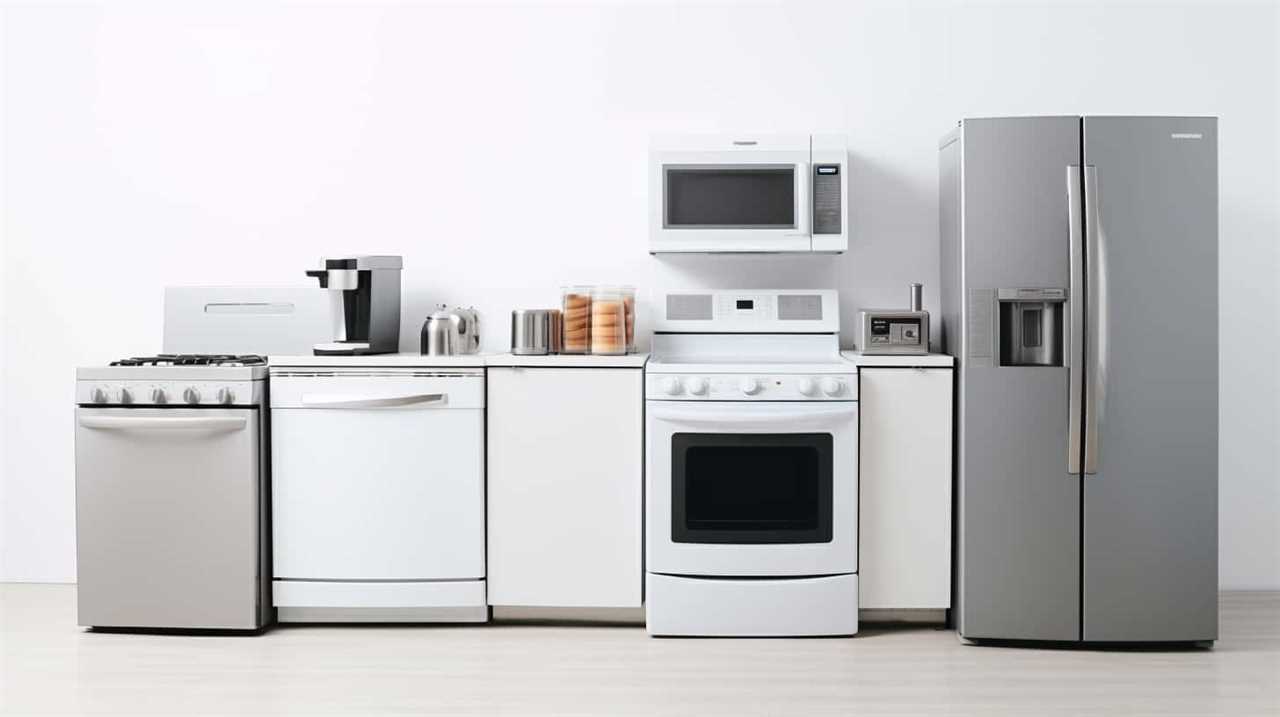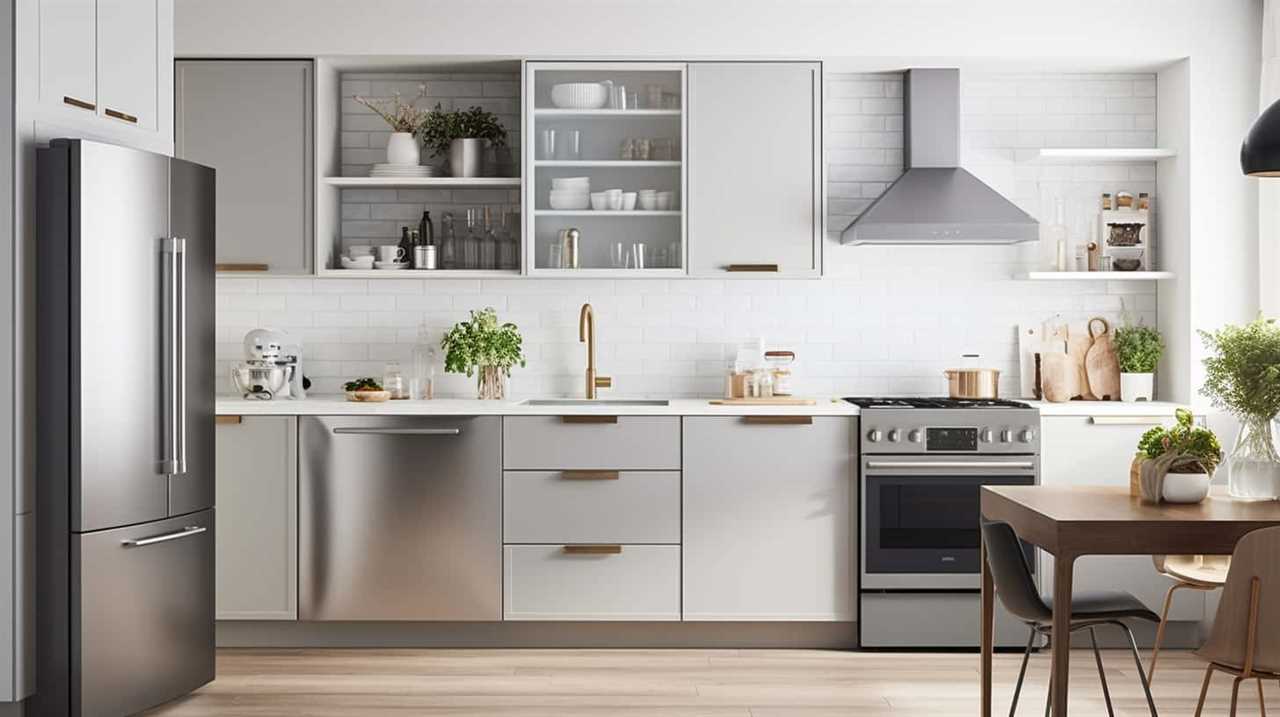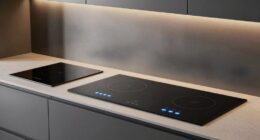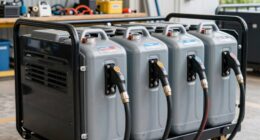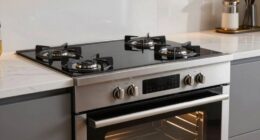Ever wondered which appliances in your household use up the most electricity? We have the answers for you.
In this article, we will delve into the data and provide you with a comprehensive breakdown of the top energy-hungry devices.
From refrigerators and freezers to air conditioners and water heaters, we will explore the culprits that contribute to your soaring energy bills.
So buckle up, because it’s time to master the art of energy efficiency.

Key Takeaways
- Refrigerators and freezers are the top energy-consuming appliances in households.
- Choosing the right size air conditioner is crucial for energy efficiency.
- Investing in energy-efficient water heaters can significantly reduce energy consumption.
- Energy-efficient options like gas dryers or heat pump dryers can reduce electricity consumption.
Refrigerators and Freezers
When it comes to appliances that consume the most electricity, refrigerators and freezers top the list. These essential kitchen appliances are responsible for a significant portion of our household energy consumption. However, there are ways to minimize their energy usage and maximize efficiency.
One key factor to consider is investing in energy efficient models. Look for appliances with the ENERGY STAR label, as they’re designed to consume less electricity while still providing optimal performance. These models often come with advanced features, such as improved insulation and temperature control, which help reduce energy waste.
In addition to choosing energy efficient models, there are several energy consumption tips to keep in mind. Firstly, avoid placing your refrigerator or freezer near heat sources, such as ovens or direct sunlight, as this can increase energy usage. Secondly, ensure proper ventilation by leaving enough space around the appliance for air circulation. Lastly, regularly clean and defrost your refrigerator and freezer to maintain their efficiency.
Transitioning into the subsequent section about air conditioners, it’s important to note that these cooling appliances also play a significant role in our energy consumption.

Air Conditioners
Now let’s shift our focus to air conditioners, another major contributor to our household energy consumption.
When it comes to energy efficiency, it’s important to choose the right size air conditioner for your space. An oversized unit will consume more electricity and may not adequately cool the room, while an undersized unit will have to work harder, leading to increased energy usage.
Regular maintenance is crucial to ensure optimal performance and energy efficiency. Here are some maintenance tips:
- Clean or replace the air filters regularly
- Clean the condenser coils
- Check for any air leaks in the ductwork
- Schedule annual professional inspections
Water Heaters
Shifting our focus to water heaters, we understand the importance of choosing the right size and maintaining them regularly to optimize their energy efficiency. When it comes to water heaters, here are five key points to consider:

- Energy efficient models: Investing in an energy efficient water heater can significantly reduce your energy consumption and lower your utility bills.
- Tankless water heaters: These alternative heating methods heat water on demand, eliminating the need for a storage tank and reducing standby energy losses.
- Heat pump water heaters: These innovative units use electricity to move heat from the air or ground to heat the water, making them highly energy efficient.
- Solar water heaters: Harnessing the power of the sun, these systems use solar panels to heat your water, reducing your reliance on traditional energy sources.
- Insulation: Properly insulating your water heater and pipes can minimize heat loss, improving overall energy efficiency.
Clothes Dryers
One appliance that consumes a significant amount of electricity in our homes is the clothes dryer. When it comes to energy efficiency, it’s important to consider the type of dryer you choose. Traditional dryers tend to be less energy efficient compared to newer models that feature advanced technologies.
Energy efficient options, such as gas dryers or heat pump dryers, can help reduce electricity consumption while still effectively drying your clothes. It’s also essential to address common maintenance issues to ensure optimal performance and energy efficiency. Regularly cleaning the lint trap and exhaust vent can prevent clogs and improve airflow, reducing energy consumption.
Additionally, proper installation and venting are crucial to avoid heat loss and improve drying efficiency. By considering energy efficient options and addressing maintenance issues, we can significantly reduce the electricity consumed by our clothes dryers.
Electric Ovens and Stoves
When it comes to energy consumption in our homes, another appliance that plays a significant role is the electric oven and stove. These kitchen staples are essential for cooking and baking, but they can also consume a considerable amount of electricity. To ensure efficient and sustainable energy usage, here are some important considerations:

- Electric stove maintenance: Regularly clean the burners and coils to remove any buildup that can hinder their performance. Keep the stove well-maintained to avoid energy wastage.
- Energy efficient oven options: Look for ovens with energy-saving features, such as convection settings or self-cleaning cycles that use less energy. Consider investing in appliances with high energy efficiency ratings to minimize electricity usage.
- Proper insulation: Ensure that the oven is well-insulated to prevent heat loss. This will reduce the need for the oven to work harder and consume more electricity.
- Optimal cooking practices: Preheating the oven only when necessary and utilizing residual heat for cooking can help save energy.
- Efficient cookware: Use cookware that efficiently conducts heat to reduce cooking time and energy consumption.
Frequently Asked Questions
How Can I Improve the Energy Efficiency of My Refrigerator and Freezer?
To improve the energy efficiency of your refrigerator and freezer, we can offer tips such as cleaning the coils, setting the temperature correctly, and keeping the doors closed. Additionally, consider energy-efficient freezer options for further savings.
What Are Some Tips for Reducing Electricity Usage While Using an Air Conditioner?
To maintain low energy consumption while using a dishwasher, we recommend running full loads, using energy-saving settings, and air drying. To reduce electricity usage when using a washing machine, opt for cold water washes and line drying.
Are There Any Energy-Saving Features or Technologies Available for Water Heaters?
Energy efficient water heaters are equipped with advanced technologies that help reduce electricity consumption. Renewable energy sources, such as solar or geothermal, can also be used for water heating, providing a sustainable and cost-effective solution.
What Are the Benefits of Using Gas-Powered Clothes Dryers Over Electric Ones in Terms of Energy Consumption?
Gas-powered clothes dryers offer energy consumption benefits compared to electric ones. They use natural gas as a fuel source, which is more efficient and cost-effective. This makes them a preferred choice for those seeking energy-efficient laundry appliances.

Are There Any Alternative Cooking Methods That Use Less Electricity Compared to Electric Ovens and Stoves?
Alternative cooking methods, such as induction cooktops and convection ovens, use less electricity compared to traditional electric stoves and ovens. These energy-efficient appliances offer precise temperature control and faster cooking times, resulting in reduced energy consumption.
Conclusion
In conclusion, when it comes to the appliances that consume the most electricity, refrigerators and freezers, air conditioners, water heaters, clothes dryers, and electric ovens and stoves top the list.
These energy-intensive appliances significantly contribute to household electricity consumption. Therefore, it’s crucial to consider their energy efficiency ratings and usage patterns to minimize electricity usage and reduce our environmental impact.
Making informed choices about these appliances can lead to significant energy and cost savings in the long run.

